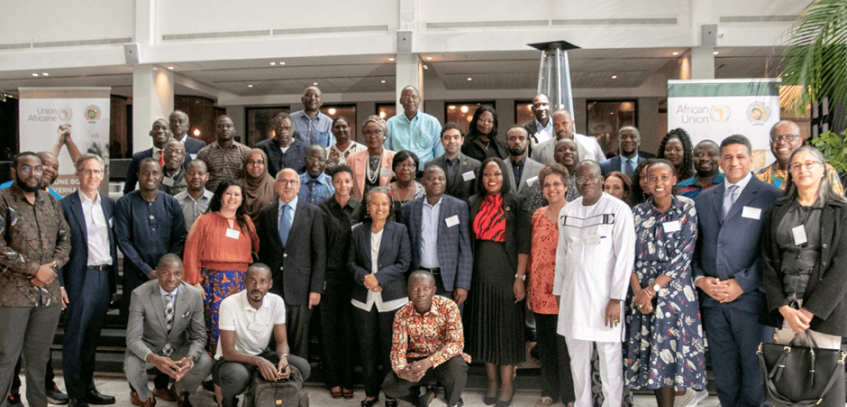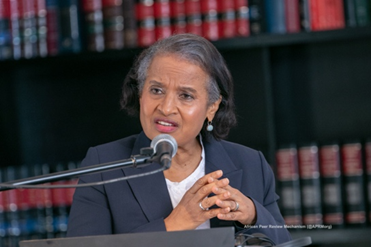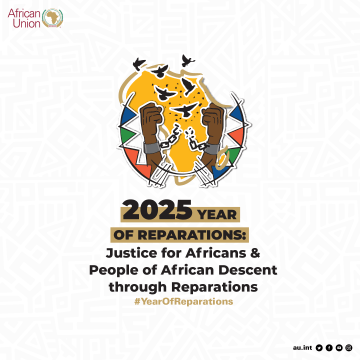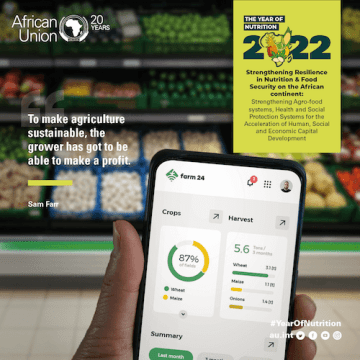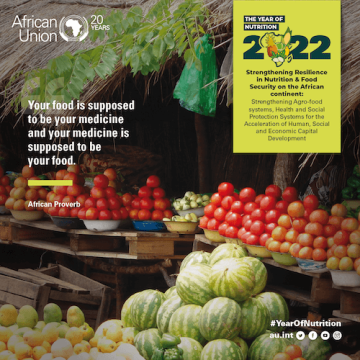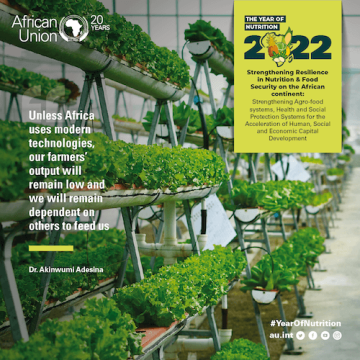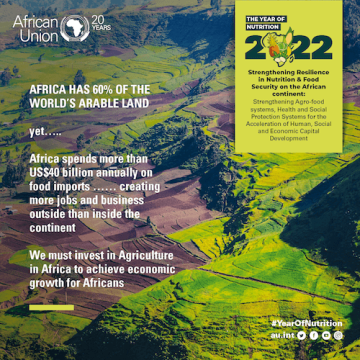29 October 2022 Cape Town, South Africa. The African Peer Review Mechanism (APRM) and the United Nations Department of Economic and Social Affairs (UN DESA), in cooperation with UNDP South Africa, the Department of Public Service and Administration of South Africa (DPSA) organized a regional workshop on ‘Strengthening National Institutional Capacities for the UN Decade of Action and Delivery for Sustainable Development and the AU Agenda 2063’.
This is the third annual regional workshop designed to explore common challenges in building effective, accountable, and inclusive institutions at all levels in Africa to accelerate the implementation of the 2030 Agenda for Sustainable Development and the African Union Agenda 2063. Senior Government officials and policymakers from across Africa including Benin, Egypt, Ghana, Kenya, Liberia, Morocco, Mozambique, Namibia, Niger, Nigeria, Rwanda, Somalia, South Africa, Uganda, Zambia, and Zimbabwe and as well as resident United Nations agencies shared in-depth knowledge and experience in guiding African societies towards a more sustainable future for all, leaving no one behind.
The CEO of APRM, Prof. Eddy Maloka, displayed that this workshop is taking place in the context of preparations for the high-level political forum (HLPF) in July 2023 and the UN 2023 SDG Summit) in September 2023, where Heads of State and Government will reconvene to comprehensively review progress in implementation of the 2030 Agenda and provide political guidance for the way forward for accelerating the full implementation of the SDGs in the remaining years towards 2030. Further, recommendations are also made to enrich the current evaluation of the First-Ten Year implementation Plan (FTYIP) and inputs for the Second Ten-year implementation Plan (STYIP) of Agenda 2063 “The Africa we want”.
In her opening remarks, H.E. Dr. Monique Nsanzabaganwa, Deputy Chairperson, African Union Commission commended the work the APRM and UNDESA have been carrying over the years with various African governments and encourage the current initiatives. She also explained that the revamped AU-UN Regional Collaboration Platform for Africa (RCP), has provided a platform to discuss continental development priorities and devise ways to drive their implementation with efficiency. In the same vein she added that “I would like to urge both organizations to explore the institutional nexus between gender and good governance, as well as the e-governance potentials in achieving the set goals...the African Union Continental Digital Transformation Strategy provides a unique opportunity to build a sustainable, viable, efficient and accountable Governance architecture for our nations”
African countries used this continental platform to share experiences in preparations for the voluntary national reviews (VNRs) in the HLPF 2022 and how reporting on CEPA principles can be incorporated to improve reporting on SDG 16 and Aspiration three- Africa with good governance, democracy and rule of law. Experts emphasized that reporting has improved on Agenda 2063 in aligned with SDGs, but more capacity building is needed at national level to advocate for the latter agenda and develop citizen-centric approach.
Experts also alluded that Africa is going through a perilous moment as the impacts of recent crises have put the achievement of the 2030 Agenda and its Sustainable Development Goals and Agenda 2063 under threat. Africa’s economic growth has slowed considerably as countries contend with the impact of the COVID-19 pandemic, climate change, rising inflation, increasing debt, conflicts, and consequences of the war in Ukraine. These interlinked crises have put both Agendas in danger and have reversed of years of progress. Urgent and transformative action is therefore needed to get back on track and regain progress on implementation of the 2030 Agenda and Agenda 2063 to achieve sustainable development in Africa.
In his opening remarks, H.E. Minister Thulas Nxesi, Acting Minister of Public Service and Administration of South Africa, noted that “CEPA principles, especially those pertinent to building competence of civil servants, sound policy making, Accountability and leaving no one behind, have strong resemblance to our guiding principles for transformative public service as stated in the “Batho Pele” white paper”. He also emphasized that “DPSA will ensure referencing to those principles during the implementation of APRM National Plan of Action for the second South Africa assessment review conducted by the APRM”.
On another note, Mr. Navid Hanif, Assistant Secretary-General for Economic Development at the United Nations alluded to the persistent issue of financing SDGs in Africa. “Funds need to be unblocked and put to productive use for Africa’s development. Importantly, Governments need the institutional capacity to ensure proper management of these public financial assets so that they are not lost in a long chain of transactions or become part of illicit financial flows”, he added.
Mme. Geraldine Moleketi, the Chairperson of UN CEPA clarified that “issue of building or rebuilding trust in government, as well as in actions of the private sector, is important for the success of initiatives and policies that tackle poverty and inequality… Citizens must also have confidence in their leadership, and leaders must be accountable to their citizens, with mechanisms that enable them to see and to check if leaders are living up to their responsibilities” she concluded.
Ambassador Collen V. Kelapile, Permanent Representative of Botswana to the UN and the Global Chair of the Group of Landlocked and former president of ECOSCO asserted that African countries, despite all challenges, recorded highest number of VNR submitted countries in the HLPF 2022. He added “such a record high number out of 44 countries that presented VNRs at the HLPF in July -- and in the middle of challenges posed by the COVID-19 pandemic -- demonstrated the strong commitment by African countries to pursue an SDG-led recovery from the pandemic through accelerated implementation of the SDGs by 2030”.
It is worth nothing that the workshop builds on efforts to implement the recommendations reached in previous joint APRM/DESA events held in 2019 and 2021, in which there has been a clear call for continued support to African countries in accelerating the implementing the 2030 Agenda for Sustainable Development and AU Agenda 2063, Africa’s blueprint for sustainable development. The two Agendas constitute the most important instruments of change towards peaceful, just and inclusive societies on the African continent. Reflecting on the workshop in general, Ms. Saras Jagwanth -Advisor at DESA- and Ms. Sara Hamouda – coordinators of the workshop, announced that more tailor- made national capacity building programs will be provided to African countries based on national requests to enhance awareness and reporting on CEPA Principles and 2030 in the upcoming two years, guided by the AU-UN framework for the implementation of Agenda 2030 and Agenda 2063.

